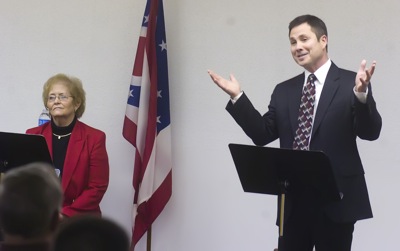Friday, April 8th, 2011
Ag official: Energy companies will court farmers
By Nancy Allen
Farmers and community leaders need to be ready for the wave of energy companies that will be seeking land lease agreements and cooperative programs for wind, natural gas, solar and biomass facilities.
"Congratulations and welcome aboard," said Dale Arnold, energy policy director with Ohio Farm Bureau, at Thursday's ag breakfast meeting in Celina. "You're going to be getting involved in this process and you and other small groups like this one are going to meet over the coming years to talk about this. I guarantee it."
In 2008, Ohio enacted broad electric industry restructuring legislation (SB 221) containing advanced energy and renewable energy generation and procurement requirements for Ohio utility companies. It mandates utilities provide 25 percent of retail electricity supply from alternative energy resources with annual benchmarks for renewable and solar energy resources. Municipal utilities and electric cooperatives are exempt.
Arnold helps residents navigate the new energy landscape and create agreements that benefit communities. The farm bureau also assists residents with complicated land lease contracts for energy production.
Any energy development will impact farm ground, Arnold said. Natural gas wells may take one acre of land while solar fields and natural gas pipelines take much more.
"The question is how are we going to make sure this ground is just as usable and good once construction is done," Arnold said.
Arnold said six natural gas pipelines are being considered across Ohio.
Farmers are exploring net metering - when farmers sell extra electricity generated on their farm from a biomass facility or solar field back to the local distribution system.
Cities need to get involved in the discussion too, Arnold said.
"A lot (of energy companies) will be working with farmers for leases or working with community leaders to create facilities in town," he said. "Communities need to discuss how they can use these technologies to benefit everybody."
Arnold suggests communities form working groups of local government, economic development and farm bureau officials, as well as interested citizens to make sure fair plans that benefit the communities are developed.
Alternative energy companies are already in Celina. Optional Energy Partners of Michigan plans to construct a manure/algae digester at the Celina Renewable Energy Center. Solar Vision of Westerville plans to build two solar plants at the same site.
Recently, NextEra Energy Resources cancelled plans to build a wind farm in southern Mercer County, but other companies may come calling in other parts of the county, Arnold said.
Other alternative energy from anaerobic digesters, solar and natural gas may be more appropriate, he said.
NextEra officials said they withdrew the project out of respect for the Land of the Crossed-Tipped Churches, most of which stretch across southern Mercer County.
Arnold said NextEra's decision likely had more to do with birds and regulations of the Ohio Power Siting Board.
"Within the last three to four years several wind companies have looked at that area and decided, due to the large migratory bird population south of the lake, not to pursue projects," Arnold said.



